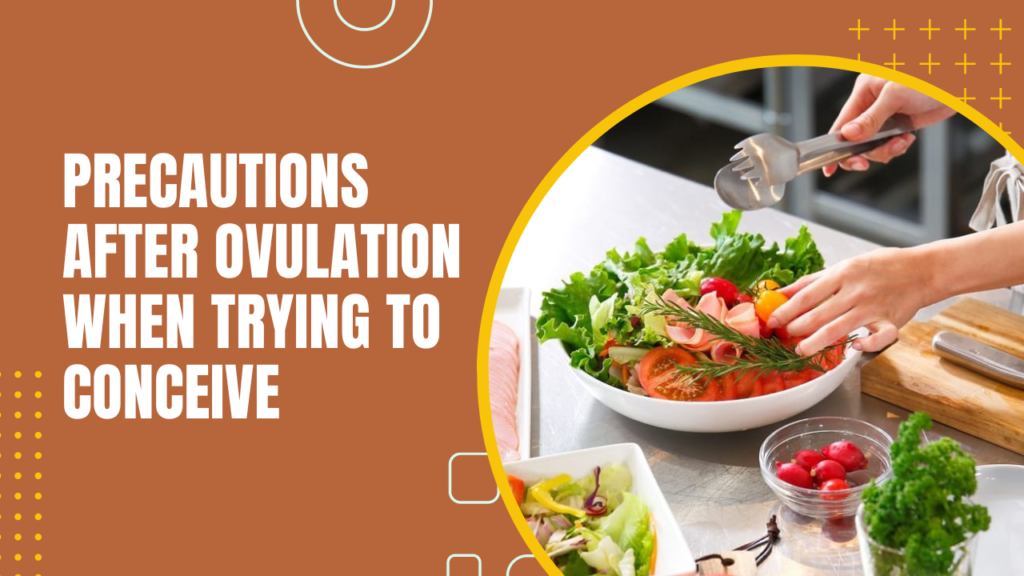If you are trying to conceive, you know that timing is everything. After ovulation, you may be wondering what precautions you should take to increase your chances of getting pregnant.
Thankfully, there are experts with proven studies who can offer guidance on this topic. Understanding your menstrual cycle is the first step in optimizing your chances of conceiving. From preconception health to dietary and lifestyle considerations, there are many factors that can impact your fertility.
By taking the proper precautions after ovulation, you can increase your chances of conceiving and ultimately achieving your dream of starting a family. Let’s explore some of the precautions and expert advice that can help you on your journey to parenthood.
Understanding the Menstrual Cycle
So, now that you’ve ovulated, it’s important to understand the different phases of your menstrual cycle and how they can affect your chances of conceiving.
One way to increase your likelihood of conception is by ovulation tracking. This involves keeping a record of your menstrual cycle and monitoring your basal body temperature, cervical mucus, and other signs of ovulation. By doing so, you can determine the most fertile days of your cycle and time intercourse accordingly.
Another important factor to consider when trying to conceive is fertility awareness. This involves becoming more attuned to your body’s natural rhythms and learning to recognize the signs of ovulation. Some common signs of ovulation include changes in cervical mucus, a rise in basal body temperature, and abdominal cramping. By paying attention to these subtle cues, you can increase your chances of getting pregnant and avoid any potential complications.
In addition to tracking your menstrual cycle and becoming more aware of your fertility, there are other precautions you can take after ovulation to increase your chances of conceiving. For example, it’s important to maintain a healthy diet and exercise regularly, as both can help boost your overall fertility. You should also avoid smoking, alcohol, and other harmful substances, as they can have a negative impact on your reproductive health.
By taking these steps and staying informed about your menstrual cycle, you can increase your chances of conceiving and enjoy a healthy, happy pregnancy.
Preconception Health
If you’re planning to conceive, it’s important to focus on your preconception health. Maintaining a healthy weight is crucial as being overweight or underweight can affect your fertility.
Managing chronic conditions and avoiding harmful substances is also essential for a healthy pregnancy. By taking care of your body before conception, you can increase your chances of a successful pregnancy and a healthy baby.
Maintaining a Healthy Weight
Maintaining a healthy weight can be a key factor in improving fertility and increasing the chances of conception, according to experts with proven studies.
It’s important to avoid stress and maintain a regular exercise routine to keep your weight in check. Being overweight or underweight can cause hormonal imbalances and disrupt ovulation, making it difficult to conceive.
To maintain a healthy weight, it’s important to follow a balanced diet and get regular exercise. Aim for at least 30 minutes of moderate-intensity exercise, such as brisk walking or cycling, most days of the week. You can also incorporate strength training exercises to build muscle and boost your metabolism.
Remember to listen to your body and not overdo it, as excessive exercise can also disrupt ovulation. By maintaining a healthy weight and lifestyle, you can increase your chances of conceiving and having a healthy pregnancy.
Managing Chronic Conditions
Managing chronic conditions can be challenging, but it’s important for you to prioritize your health and work with your healthcare provider to find a treatment plan that works for you and doesn’t interfere with your fertility goals. If you have a chronic condition such as diabetes, high blood pressure, or thyroid issues, it’s important to manage it properly before and after ovulation. This can help minimize any potential risks to pregnancy and ensure that your body is in the best possible condition to conceive.
One important aspect of managing chronic conditions is medication management. Make sure to discuss any medications you are taking with your doctor and ask if they could potentially interfere with conception or harm a developing fetus. Your doctor may be able to adjust your medication or provide alternative options that are safer for pregnancy. It’s also important to keep up with regular doctor’s consultations to monitor your condition and make any necessary adjustments to your treatment plan. By taking these steps, you can ensure that you are doing everything you can to manage your chronic condition and increase your chances of conceiving.
| Chronic Condition | Medication |
|---|---|
| Diabetes | Insulin, Metformin |
| High Blood Pressure | Lisinopril, Atenolol |
| Thyroid Issues | Levothyroxine, Methimazole |
| Asthma | Albuterol, Fluticasone |
| Depression/Anxiety | Sertraline, Escitalopram |
Table: Examples of Chronic Conditions and Commonly Prescribed Medications
Avoiding Harmful Substances
You can protect your fertility by avoiding harmful substances such as tobacco, alcohol, and recreational drugs. These substances not only decrease your chances of conceiving but also increase the risk of miscarriage and birth defects. It’s important to note that even second-hand smoke can have detrimental effects on fertility and pregnancy. Therefore, it’s best to avoid all forms of harmful substances when trying to conceive.
In addition to avoiding harmful substances, tracking ovulation and reducing stress can also improve your chances of conceiving. By tracking ovulation, you can determine your most fertile days and time intercourse accordingly. This can increase the likelihood of fertilization and successful pregnancy.
Additionally, reducing stress can improve hormonal balance and increase the chances of conception. Engaging in relaxation techniques such as yoga, meditation, and deep breathing exercises can help reduce stress levels and improve fertility.
Optimizing Sexual Intercourse
Make sure to have sex every other day during your fertile window to increase your chances of conception! Timing strategies play a key role in optimizing sexual intercourse when trying to conceive.
It’s important to know your menstrual cycle and when you are ovulating. This will help you to plan your sexual activity accordingly.
Communication tips are also important when it comes to optimizing sexual intercourse. Make sure you’re on the same page with your partner about your fertility goals. Talk openly about your expectations and any concerns you may have. This will help to alleviate any stress or pressure during the process.
Remember, it takes two to make a baby, so make sure you’re both comfortable and ready.
It’s also important to keep in mind that stress can have a negative impact on fertility. Try to relax and enjoy the process. Don’t put too much pressure on yourselves or the situation.
Remember that conception can take time and it’s important to stay patient and positive.
By following these timing strategies and communication tips, you can increase your chances of conception and make the process less stressful and more enjoyable.
Dietary and Lifestyle Considerations
When it comes to increasing your chances of conception, it’s important to consider your dietary and lifestyle choices. Eating fertility-friendly foods is a great place to start. These foods are rich in nutrients that support reproductive health. Some examples include leafy greens, berries, nuts, and whole grains. It’s also important to stay hydrated by drinking plenty of water and avoiding sugary drinks.
In addition to eating fertility-friendly foods, exercise can also play a role in improving your chances of conception. Moderate exercise is recommended, as it can help regulate hormones and improve circulation to the reproductive organs. However, it’s important to avoid over-exercising, as this can actually have the opposite effect and decrease fertility. It’s also important to avoid activities that could cause injury or trauma to the pelvic area.
Overall, making dietary and lifestyle changes can help improve your chances of conception after ovulation. Eating fertility-friendly foods and engaging in moderate exercise can support reproductive health and increase your odds of getting pregnant. Remember to consult with a healthcare professional for personalized recommendations and guidance.
Fertility Supplements
If you’re looking to enhance your fertility, it’s worth exploring the benefits of fertility supplements. These supplements come in different forms such as vitamins, minerals, and herbs. They are believed to improve fertility by regulating hormones, improving egg quality, and increasing sperm count and motility. However, it’s important to note that not all supplements are created equal, and some may have side effects or interact with other medications.
To help you make informed decisions, here’s a table that summarizes some of the most commonly used fertility supplements, their recommended dosages, and possible side effects and interactions:
| Supplement | Recommended Dosage | Possible Side Effects/Interactions |
|---|---|---|
| Coenzyme Q10 | 200-600mg/day | May cause stomach upset, insomnia, and allergic reactions; may interact with blood thinners and chemotherapy drugs |
| Folic acid | 400-800mcg/day | Generally safe, but high doses may mask symptoms of vitamin B12 deficiency |
| Omega-3 fatty acids | 1-3g/day | May cause fishy aftertaste, nausea, and diarrhea; may interact with blood thinners and some medications for high blood pressure |
| Vitamin D | 600-800IU/day | May cause nausea, vomiting, and constipation; may interact with some medications for heart disease and high blood pressure |
| Zinc | 15-30mg/day | May cause nausea, vomiting, and diarrhea; high doses may impair immune function and copper absorption |
It’s important to remember that while these supplements may be effective in improving fertility, they should not be used as a substitute for a healthy diet and lifestyle. It’s also recommended to consult with a healthcare professional before taking any supplements, especially if you have underlying medical conditions or are taking medications that may interact with them.
Hormone Therapy
You may be considering hormone therapy as a way to address fertility issues, but it’s important to understand the potential risks and side effects before making a decision. While hormone therapy may be effective in stimulating ovulation, there are natural alternatives that may produce similar results without the possible risks associated with hormone therapy.
Some possible risks of hormone therapy include an increased risk of blood clots, ovarian hyperstimulation syndrome, and multiple pregnancies. Additionally, long term effects are not yet fully understood, making it difficult to fully evaluate the safety of hormone therapy.
It’s important to discuss all possible risks and concerns with a healthcare provider before deciding to pursue hormone therapy. While hormone therapy may have a high success rate in inducing ovulation, it’s important to weigh the potential risks and side effects against the benefits.
Natural alternatives such as changes in diet, exercise, and stress reduction may also be effective in addressing fertility issues without the potential risks associated with hormone therapy. Ultimately, it’s important to discuss all options with a healthcare provider and make an informed decision based on individual needs and concerns.
Assisted Reproductive Technologies (ART)
To increase your chances of success, consider assisted reproductive technologies (ART), which include procedures such as in vitro fertilization (IVF) and intracytoplasmic sperm injection (ICSI). These methods are often used when other fertility treatments have failed, or when there’s a known issue with the male partner’s sperm count or the female partner’s ability to ovulate.
Success rates for ART vary depending on the specific procedure and individual factors, but they can be as high as 50% or more for some couples. However, it’s important to consider the ethical concerns surrounding ART. Some people argue that these technologies interfere with the natural process of reproduction and may have negative effects on the health of the mother and child.
Additionally, the cost of ART can be prohibitively expensive, and not all couples have access to these treatments. It’s important to weigh the potential benefits and drawbacks of ART before making a decision about whether to pursue these options.
Ultimately, the decision to use ART is a personal one that should be made in consultation with a qualified fertility specialist. Your doctor can help you understand the risks and benefits of these treatments, and can work with you to develop a plan that’s tailored to your individual needs and goals.
With the right approach and support, many couples are able to achieve their dreams of starting a family.
Male Fertility Factors
Now that you’ve learned about Assisted Reproductive Technologies (ART), it’s time to focus on male fertility factors. When trying to conceive, it’s important to understand that both partners play a vital role in the process.
While women undergo numerous changes during ovulation, men also have their own set of concerns. One of the first things that come to mind when discussing male fertility is sperm count. Sperm count refers to the number of sperm present in a man’s semen, and it’s one of the critical factors in determining male fertility.
A low sperm count can make it difficult to conceive, but there are several ways to increase the count, such as avoiding hot baths or wearing tight underwear. Another essential factor in male fertility is sperm motility. Sperm motility refers to the ability of sperm to move correctly through the female reproductive system.
If the sperm isn’t motile enough, it may not reach the egg, making conception challenging. There are several factors that can affect sperm motility, such as smoking, drinking, and poor diet. It’s crucial to maintain a healthy lifestyle to improve sperm motility and increase the chances of conception.
Managing Expectations
Managing expectations is crucial when it comes to fertility and conception. After ovulation, it’s important to stay patient and not get discouraged if you don’t get pregnant right away. Remember, it can take up to a year for a healthy couple to conceive.
Emotional support is also important during this time. Talk to your partner, friends, or a therapist about your feelings and concerns. You’re not alone in this journey.
Dealing with setbacks is also a part of managing expectations. If you’ve been trying for several months without success, it may be time to seek medical help. Your doctor can perform tests to determine if there are any underlying issues that may be preventing conception.
It’s important to stay positive and proactive in your approach to fertility. There are many options available, such as fertility treatments or adoption, that can help you build the family you’ve always dreamed of.
Lastly, take care of yourself both physically and mentally. Eating a healthy diet, getting regular exercise, and reducing stress can all improve your chances of conceiving. Remember to be kind to yourself and your partner, and take breaks from trying to conceive if necessary.
Managing expectations is a process, and it’s important to stay focused on your ultimate goal while also taking care of yourself along the way.
Frequently Asked Questions
How long after ovulation can a pregnancy test accurately detect pregnancy?
You can take a pregnancy test about two weeks after ovulation for accurate results. Fertility supplements and ovulation detection methods can help pinpoint ovulation. Ensure you use a reliable test for best accuracy.
Can stress affect fertility during the post-ovulation stage?
Stress can affect fertility during the post-ovulation stage. Stress management and relaxation techniques can help reduce stress levels. Additionally, a healthy diet can have a positive impact on fertility.
Are there any specific exercises or physical activities that can improve fertility after ovulation?
Incorporating yoga and Pilates into your routine can be effective exercises for boosting fertility after ovulation. Additionally, maintaining a healthy diet with proper nutrition and supplements can also improve your chances of conceiving.
How can one determine their fertile days after ovulation if they have irregular menstrual cycles?
If you have irregular menstrual cycles, it can be difficult to determine your fertile window. One way to track ovulation is by using ovulation predictor kits or tracking basal body temperature. Consult with a healthcare provider for personalized guidance.
Can certain medications or medical conditions affect fertility during the post-ovulation stage?
Certain medications and medical conditions can affect your fertility during the post-ovulation stage. Medication effects and medical conditions impact the quality of your egg, making it difficult for fertilization. Consult with your doctor to determine the best course of action.
Conclusion
Now that you’ve learned about the precautions to take after ovulation when trying to conceive, it’s time to put this knowledge into practice.
Remember, the key to successful conception is a healthy lifestyle, regular exercise, and a balanced diet. Make sure to discuss any concerns or questions with your healthcare provider, and consider incorporating fertility supplements or hormone therapy if necessary.
It’s important to manage your expectations and understand that conception may not happen immediately. Don’t become discouraged and continue to prioritize your health and wellness.
With patience, persistence, and these precautions in mind, you can increase your chances of a successful pregnancy and a healthy baby. Good luck on your journey to parenthood!


